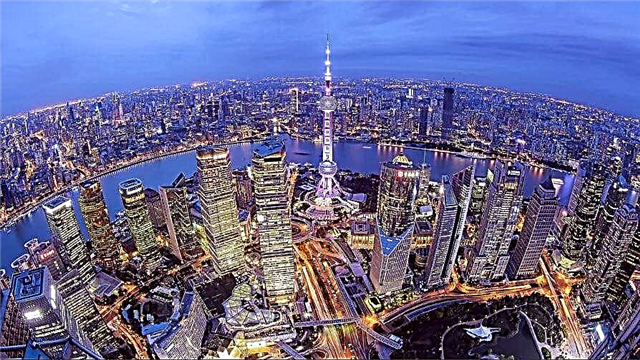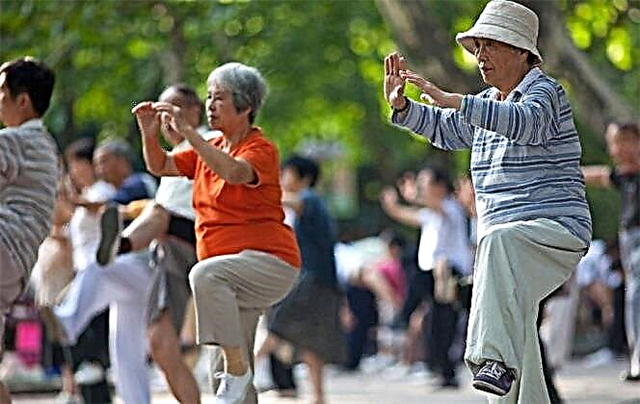The difficult political situation observed in the PRC in the past century has significantly complicated the life of the country's citizens who have retired. Illiterate governance combined with erroneous reforms led to the fact that even at the end of the second decade of the 21st century, pensions in China are not paid to all elderly people: they have to rely on the help of children or overcome financial difficulties in other ways. So, more recently, only officials and employees of state-owned companies received social benefits in the Celestial Empire.

Is there a pension in the PRC
Even the low level of unemployment and the dynamic development of the country's economy in recent years did not offset the need for pension reform in the PRC. The reason was a combination of factors:
- a huge number of elderly people;
- China's pension system was not originally designed for such a large population;
- a constant increase in the number of elderly people;
- changes in political course.
The collapse of the communes that occurred in the 70s of the last century caused a disastrous situation primarily among the peasants. They were completely deprived of government support.
The arrival of the 21st century was marked by the fact that the answer to the question of whether there is a pension in China for residents of agricultural provinces began to sound more optimistic: such a social allowance is already being paid to peasants. True, its size is much lower than even the minimum pension that Russian pensioners receive.
Features of the pension system
Reform of the social security system for Chinese retirees was carried out in 1997. Since then, the Chinese pension program provides for the formation of pensions for employees and workers at the expense of the National Social Security Fund, accumulative pension funds, as well as, as is customary in economically developed countries, deductions from salaries. In the latter case, 20% is paid by the employer, and the employee - 8%.
The standard of living and the size of pensions in different provinces of the PRC differ significantly. Therefore, elderly people, who are entitled to a high pension at the place of registration, often move to the southern provinces, where prices are lower, and the climate is milder.
The system does not provide benefits to Chinese pensioners. But at the local level, there are sometimes certain indulgences. Let's name the most important ones:
- Free medical care including acupuncture and massage.
- Free diagnostics of the state of health on any equipment that is required for its implementation.
- Meals in public canteens for a nominal fee.
- Classes of traditional Chinese gymnastics qigong and tai chi (in specialized centers) are also free of charge.
The problems that characterize the current pension provision, the Chinese authorities plan to solve by implementing the following measures:
- creation of conditions that stimulate longer labor activity of elderly people. But the age of retirement has remained the same. This will be discussed below;
- cancellation of allowances for civil servants;
- unification of urban and rural pension systems;
- reducing the difference in the volumes of regional pension budgets.
Who in China receives an old-age pension
 Those who are interested in who receive an old-age pension in China should take into account that the aging process of the population in the PRC, in fact, like in most countries of the world, is accelerating at a rapid pace. But a significant contribution to this negative trend in the Celestial Empire was made by the demographic policy of the 70s of the last century, which stipulates that there should be only one child in a family.
Those who are interested in who receive an old-age pension in China should take into account that the aging process of the population in the PRC, in fact, like in most countries of the world, is accelerating at a rapid pace. But a significant contribution to this negative trend in the Celestial Empire was made by the demographic policy of the 70s of the last century, which stipulates that there should be only one child in a family.
In general, the official statistics, when asked how many retirees are in China in 2021, gives the following answer:
- 226 million people over the age of 60 (this is 17.9% of the total population);
- 176 million people over 65 (11.9%).
An applicant for social benefits based on gender must meet certain age indicators.
There are also requirements for seniority. Thus, employees, private entrepreneurs and employees working at their enterprises will be paid an old-age pension if they have worked for at least 15 years. Moreover, during all this time, deductions to the China Pension Fund (hereinafter - PF) should be regularly made from the salaries of these persons.
Retirement ages for women and men
In patriarchal China, caring for and honoring parents has always been recognized as one of the most important virtues. This became especially true after the collapse of the communes.
At the same time, at present, the younger generation does not need to spend a lot of money on ensuring a normal life for parents: the law establishes such a retirement age when an elderly person is not only able to adequately assess the environment, but also independently solve some problems of a domestic nature.
In numbers, it looks like this:
- the old age pension is payable to women aged 50 or 55. The specific value of the indicator depends on the working conditions and the scope of the enterprise;
- in China, a pension is calculated for men who have crossed the age limit at the level of 60 years.
What is the amount of pension payments
Retirement in China does not mean that an elderly person will receive decent social benefits. The amount of such state aid is about 1/5 of the average salary, which is paid in a particular city, and even less in rural areas - 1/10 of the average earnings.
In addition, during labor activity, a citizen transfers money to his personal retirement account, which will later be used for an additional payment of 60% of the average salary in the region.
The average pension in China in 2021 for rural residents is 129 yuan (1,238.74 rubles), and for urban residents - 2.5 thousand yuan (2,4006.5 rubles). This social benefit is indexed annually. The growth rate of the average wage in the province is used as the input for the recalculation.
During the period when the economy of the Celestial Empire was developing rapidly, indexation was in the range of 9-10%. In recent years, payments have increased by an average of 5-7%.
The answer to the question of what kind of pension the Chinese pensioners have will be incomplete without mentioning the maximum and minimum values. Thus, in Shanghai and Beijing, the pension amounts to 3.5 thousand yuan (33,609 rubles). And the minimum pension of an elderly person living in an agricultural province is only 88 yuan (845 rubles).
Pension crisis in the PRC
 The main reason for the pension crisis in the PRC - the aging of the nation - was mentioned above. The number of Chinese citizens who have retired exceeds the entire population of Russia. And in general, contributions to the Pension Fund are made from the income of each young worker, distributed among several pensioners.
The main reason for the pension crisis in the PRC - the aging of the nation - was mentioned above. The number of Chinese citizens who have retired exceeds the entire population of Russia. And in general, contributions to the Pension Fund are made from the income of each young worker, distributed among several pensioners.
There is also the following serious danger. According to experts, in a relatively short period of time - 25-30 years, that is, by the middle of this century, there will be less than 2 Chinese people who are able to work actively per person of advanced age. Meanwhile, the media reported that the plans of the Chinese Communist Party do not include raising the age for retirement until 2045.
The pension situation is further complicated by the fact that the Chinese are very distrustful of funds. The population prefers to keep money savings at home.Citizens are not even afraid of the presence of control and the imposition of a fine when such a fact is revealed.
Many businesses also seek to hide their full income from the authorities. All this has led to the fact that pension funds lose billions of yuan annually.
State structures dealing with pension issues also have problems in their work. The reason is the rapid increase in the number of people taking care of a well-deserved rest. Social services simply cannot handle the ever-increasing volume of work. Therefore, the authorities plan to reform this sector as well.
Russian pensioners in the PRC
Russian pensioners have recently begun to change their place of residence more and more often, giving preference to the small northern cities of the Middle Kingdom. Among the centers of the so-called new emigration, in which Russian pensioners in China mainly live, is the city of Hunchun, located near the border of the Primorsky Territory, as well as the city of Heihe, located on the opposite bank of the river from Blagoveshchensk (Amur Region). More than 200 such immigrants from Russia live in the first of these settlements alone.
The main reason for the move of Russian pensioners to the PRC is the cheapness of living. The cost of real estate in China is several times lower compared to domestic prices.
For example, the price of a 1-room apartment in the Far East hovers around 2 million rubles. At the same time, similar housing in Heihe is estimated at about 52 thousand yuan (about 500 thousand rubles).
The question arises, how in China live without pensions accrued from the budget of this country, Russian pensioners who have moved to the Celestial Empire for permanent residence. The problem is solved very simply: once a quarter, they go to the Russian Federation and receive a pension immediately in 3 months.
Moreover, in many trade enterprises of the border area, including in the city of Heihe, the ruble is accepted on a par with the yuan. And, for example, settlements in the morning market of this settlement - Wenhua - are completely preferable to carry out in Russian, rather than in local currency.
Where do Russian pensioners live better in China?
 In addition to these two towns, Russian pensioners traditionally move to Harbin. Its population exceeds 10 million. Along with inexpensive real estate, this city also attracts older immigrants from Russia with its mild climate.
In addition to these two towns, Russian pensioners traditionally move to Harbin. Its population exceeds 10 million. Along with inexpensive real estate, this city also attracts older immigrants from Russia with its mild climate.
In addition, the historical factor makes a significant contribution to this choice. After the Civil War, more than 120 thousand representatives of the former Russian Empire settled in Harbin. And although the political transformations of the middle of the 20th century reduced the Russian diaspora, relatives of pensioners living in the Russian Federation still live in this city.
Another city of the Middle Kingdom, known for Russian roots, is Dalian. Even its central square was named after Stalin. And today in the center of the seaside Dalian there is a Russian street.
The diaspora in this city is not as large as in Harbin, but it is not excluded that the current Russian pensioners here too will be able to find relatives and, upon their invitation, change their place of residence.
The conviction that the life of pensioners in China, who receive a Russian pension, is better than in the Russian Federation, makes Russians, figuratively speaking, burn all bridges: to sell real estate at home and buy housing in the Middle Kingdom with the proceeds.
Having moved to the PRC, they can also postpone. After all, here not only utilities are less expensive, but food is also cheaper than in Russia.
As practice shows, it is enough for an ordinary married couple to spend 2,000–3,000 rubles a month for good nutrition.
One cannot ignore the availability of medical services in China - for people of age this is very important. For example, Hunchun is considered a sanatorium resort for Russian pensioners.
Conclusion
The legislation of the PRC establishes that women can retire at the age of 55, and if their labor activity is associated with manual labor, then even at 50. Men go on a well-deserved rest at the age of 60.
Both the employer and the employee make payments to the Pension Fund. In China, an annual indexation of pensions is carried out.
The population of the Celestial Empire is aging at a rapid pace. By the middle of the 21st century, there will be less than 2 people per pensioner who are able to carry out active labor activities.











